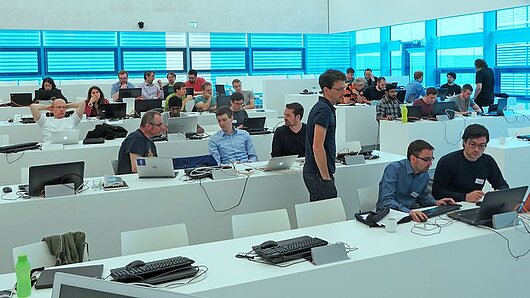High-Performance Computing Center Stuttgart

"Every time you help individual users to utilize the machine more efficiently you enhance the capabilities of the computer as a whole," says Thomas Bönisch, leader of the HLRS user management team. "By ensuring that applications are optimized for the computing hardware they are run on, we can get a lot more science out of the same computing resources."
Enhanced user support involves more than helping users port codes or transfer data. Instead, scientists receive hands-on, personalized advice for improving their codes' performance on HPC resources. This can occur at several levels: selecting and optimizing the best algorithm for a particular problem and supercomputer, improving its ability to scale up to parallel computing networks, structuring it to take advantage of unique characteristics of the specific processors that make up the system, and eliminating bottlenecks in the movement of large datasets.
While some computational scientists develop their own computational tools for analyzing a scientific problem, others rely on community-built codes or open-source software. In either case, they can benefit from the help of HPC experts in selecting the best tools and optimizing their performance. This can make a big difference, making it possible to ask new, more computationally demanding kinds of scientific questions.
Since 2016 HLRS has held a biannual optimization workshop in which Hazel Hen users meet with support staff to identify opportunities for improving their codes' performance. These meetings have been very productive, resulting in improvements in runtime and data transfer speeds; in some cases, codes can end up running twice as fast, or faster.
With grants provided by the Baden-Württemberg Ministry of Science, Research, and Art, HLRS added new staff positions in 2018, each of which is dedicated to supporting specific user groups all year round. In this way, deeper collaborative relationships can develop in which experts in scientific domains and experts in high-performance computing regularly exchange ideas, working together to continually improve computational tools.
This enhanced user support initiative has also made it possible to improve coordination of user support activities between HLRS and its GCS partner institutions, the Jülich Supercomputing Centre and Leibniz Supercomputing Centre. Representatives of the three centers now meet regularly to share knowledge about their accomplishments in improving computational efficiency. In this way, the initiative promises to raise the performance of users' codes across Germany's entire national supercomputing infrastructure.
— Christopher Williams